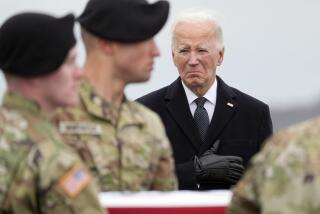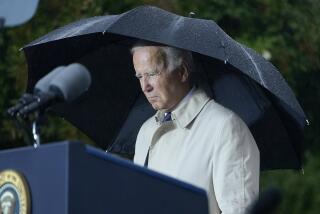Bush Salutes War-Weary Army Division
- Share via
FT. STEWART, Ga. — President Bush delivered a personal thank you Friday to the soldiers and families who bore the brunt of the burden in Iraq -- the Army’s 3rd Infantry Division, which was the first to deploy, the first across the border and the first into Baghdad.
“After a long deployment, the 3rd ID is now home,” Bush said to whoops from several thousand troops in desert camouflage arrayed on bleachers under a hot sun. “America is grateful for your devoted service in hard conditions. America is grateful to the men and women right here on this base who supported your mission. And we’re especially grateful to our military families.”
The 3rd Infantry supplied more than 20,000 troops to the operation, most of them front-line troops who dashed up the western side of the country to seize Baghdad’s international airport. In recognition, Bush presented the division the Presidential Unit Citation for “extraordinary heroism” in action above and beyond that of other units.
“You’ve made history. You’ve made our nation proud. And you have earned the Presidential Unit Citation,” Bush said.
The 3rd Infantry also served longer than other divisions in Iraq; some units were taking part in exercises in Kuwait in August 2002 and stayed in the region for the better part of a year. The last units made it home to Georgia just three weeks ago, base officials said, even as other units are redeploying.
Discontent over the extended deployments flared during the summer, with some military families shedding the stoicism that usually marks military service to organize protests and e-mail campaigns at the base.
The division’s fatigue appeared evident in the response to the president’s remarks. Bush’s speeches at military bases are commonly interrupted repeatedly by sustained and frequent cheers. On Friday, while Bush got an enthusiastic Army “hoo-ah” shout when he began and a standing ovation at the end, most of the rest of his speech was greeted with polite applause.
Pvt. Kenneth Henry, 21, a radar operator with a field artillery unit, said the response was muted by the pervasive knowledge among the soldiers and their families that they will likely have to return to Iraq soon.
“How could you make these people feel better when you just said you’re putting $87 billion into sending them back?” Henry asked.
Henry spent about six months in Iraq, traveling from Kuwait over the border to Nasiriyah and through the Karbala Gap before helping to take the Baghdad airport. He said he lost about 10 members of his unit, the Alpha 1-39 Field Artillery, and he’s not eager to go back.
“What I heard him say was, ‘You went there. You took names. Came home. Now you’re going back,’ ” Henry said. “He likes war. He should go fight in a war for two days and see how he likes it.”
After the speech, Bush paid a private visit to the families of the 38 division soldiers who died in the operation, and his reception was reported to be warmer.
“They shared hugs, laughs and tears,” said a senior administration official, who added that by the end of the 35-minute meeting, the group was in high spirits. “They were taking pictures and getting him to sign cards. The president thanked the families for their loved ones’ service to the country.”
A total of 290 American service members have died in Iraq and more than 1,100 have been wounded since the campaign began March 20. More than half of the fatalities, 152, have occurred since Bush declared an end to major combat operations on May 1.
In his speech, Bush hailed the Iraq operation as “one of the swiftest and most humane military campaigns in history.” And he used some of the strongest language in recent weeks about weapons of mass destruction, implying that Saddam Hussein’s regime possessed them even though none have yet been found.
“Because of our military, catastrophic weapons will no longer be in the hands of a reckless dictator,” he said. “Because of our military, Middle Eastern countries no longer fear subversion and attack by Saddam Hussein. Because of our military, the torture chambers in Iraq are closed and people who speak their mind need not fear execution. Because of our military, the people of Iraq are free.
“No free nation can be neutral in the fight between civilization and chaos,” the president said. “Terrorists in Iraq have attacked representatives of the civilized world, and opposing them and defeating them must be the cause of the civilized world.”
Secretary of State Colin L. Powell is in Geneva today to cajole allies to donate money and troops. Some allies and critics have complained that Iraq did not pose a terrorist threat to the United States until after the American intervention.
“We’re rolling back the terrorist threat, not on the fringes of its influence but at the heart of its power,” Bush said. He challenged other nations to join the U.S. occupation of Iraq.
After visiting Ft. Stewart, Bush flew to Mississippi and attended a fund-raiser for the gubernatorial campaign of Republican candidate Haley Barbour. He attended a second fund-raiser in Houston on Friday night to benefit a church-led community development corporation the president sees as a model faith-based organization.
“This was once an empty Kmart building. It is now a building full of love,” the president said about Houston’s Power Center, a one-stop community services provider led by the Rev. Kirbyjon Caldwell. “People should realize that the reason this center is successful is that the power in the Power Center comes from ... a higher power,” Bush said. The Power Center, which celebrates its 10th anniversary this year, should be a role model for faith-based organizations, he said.
Bush complained that many in Washington use the separation of church and state to unfairly exclude faith-based groups from federal programs.
“Government has thwarted faith to be involved in our communities because of what they call the doctrine of separation of church and state,” Bush told the audience of 800 donors. “And that’s a noble doctrine; the church should never be the state, and the state certainly should never be the church. But our government must not fear the application of faith into solving social problems. We must not worry about people of faith receiving taxpayers’ money to help people in need.”
After returning to Washington, Bush headed to his retreat at Camp David, Md., where he planned to spend the weekend.
More to Read
Sign up for Essential California
The most important California stories and recommendations in your inbox every morning.
You may occasionally receive promotional content from the Los Angeles Times.










